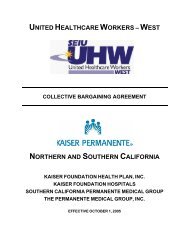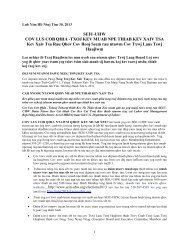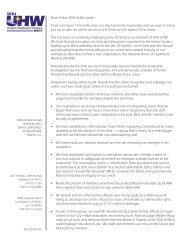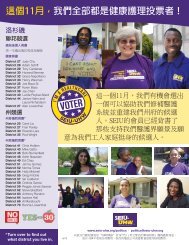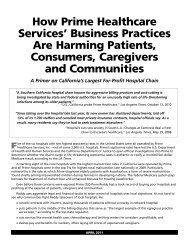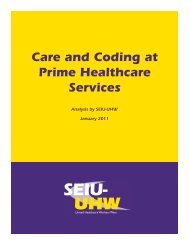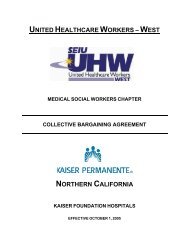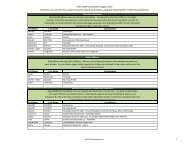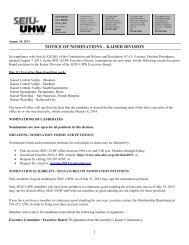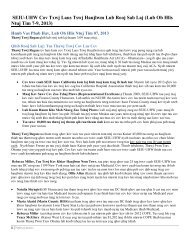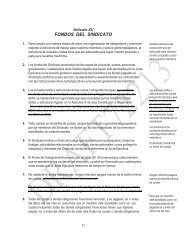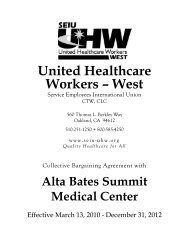CONSTITUTION AND BYLAWS - Seiu-uhw
CONSTITUTION AND BYLAWS - Seiu-uhw
CONSTITUTION AND BYLAWS - Seiu-uhw
Create successful ePaper yourself
Turn your PDF publications into a flip-book with our unique Google optimized e-Paper software.
CONTENTSArticleI Name ...................................................................................... 1II Mission and Purpose ....................................................................... 1III Jurisdiction ................................................................................ 2IV International Constitution .................................................................. 2V Affiliations ................................................................................. 3VI Member Rights and Responsibilities . . . . . . . . . . . . . . . . . . . . . . . . . . . . . . . . . . . . . . . . . . . . . . . . . . . . . . . . 3VII Membership ............................................................................... 3VIII Steward/Leader or Area Leader ............................................................. 4IX Worksite and Area Steward/Leadership Councils ........................................... 6X Divisions and Division Steward/Leadership Councils ........................................ 8XI Leadership Structure ......................................................................10XII Committees and Central Labor Council Delegates .........................................16XIII Membership Meetings/Annual Leadership Conference ....................................18XIV Collective Bargaining ......................................................................19XV Funds of the Union ........................................................................20XVI Strikes ....................................................................................21XVII Due Process and Hearing Procedures ......................................................22XVIII Amendments .............................................................................22XIX Procedure and Debate ....................................................................23XX Dissolution ................................................................................23XXI Property Rights of Members ..............................................................23XXII Nominations and Elections . . . . . . . . . . . . . . . . . . . . . . . . . . . . . . . . . . . . . . . . . . . . . . . . . . . . . . . . . . . . . . . . 24XXIII Recall .....................................................................................26XXIV Obligation to Abide .......................................................................27XXV Non-Liability of Local Union ...............................................................27XXVI Rights by Law .............................................................................27XXVII Installation Pledge ........................................................................28XXVIII Membership Pledge ......................................................................28Appendix A ...............................................................................29Appendix B................................................................................30iii
Article INAMEThis is the Constitution and Bylaws of SEIU United Healthcare Workers -West, (SEIU-UHW)affiliated with the Service Employees International Union (SEIU), Change to Win (CTW) andCanadian Labour Congress (CLC). Our union is affiliatedwith the ServiceEmployees InternationalUnionArticle IIMISSION <strong>AND</strong> PURPOSEOur mission is to build a workers’ organization dedicated to being a powerful force tochange workers’ lives and fight for social and economic justice. Our vision of a workers’organization is one in which there is an expectation that members lead and decidetogether; one in which conflict is embraced as healthy, necessary, and an inevitable part ofmaking positive change; and one in which the Union’s integrity is beyond reproach.Our purpose is to promote better working conditions and a better future for our membersand all working people. It is our objective to build a strong and more effective labormovement by organizing unorganized workers, building an effective political voice forworking people, and protecting all workers from unacceptable or unjust actions byemployers.Our mission is to builda workers’ organizationwhere members lead thefight for social justiceOur purpose is topromote a better futurefor us and for all workingpeopleWe are committed to improving our working lives; supporting our families; ensuring thatwe are able to provide the best quality care to our patients, consumers, and residents; andpromoting quality, affordable health care for all.As members of SEIU-UHW, we have long shared a set of common principles and values thatbind us together and create a unified vision of our future.Commitment to DemocracyWe are a workers’ organization run by and for members. We have the right to vote on all ofour contracts and elect stewards/leaders or area leaders and bargaining teams. We committo respecting and engaging the full range of members’ ideas and opinions. And we urge allmembers to participate in decision-making and in the full array of union activities, includingbargaining, organizing, political action, and building strength on the job.Five values create aunified vision for ourunionWe are run by and formembersCommitment to Honesty and AccountabilityElected officers, board members, bargaining teams, stewards/leaders or area leaders,and staff will be accountable to members. Dues revenue will be spent only to serve thebest interests of members, and all expenditures will be fully and honestly reported to themembership.We will be honest andaccountable in all ourdecisionsCommitment to High StandardsWe will maintain the high industry standards we have long set for wages, benefits, andworking conditions in acute care, home care, nursing homes and every field in which weWe will work to achievehigh industry standards1
have members. We will demand a strong voice in patient and resident care decisions. Andwe commit to standing united to take whatever action is necessary to win the best possiblecontracts and achieve those contracts quickly and efficiently.Commitment to JusticeWe will work to create amore just and humanesocietyWe pledge to help create a more just and humane society. We will fight for equality andfairness, and seek full participation in our Union from members of every race, ethnicity,religion, age, physical ability, gender, gender expression, or sexual orientation. To achievethis, we will empower all SEIU-UHW members to stand up for our rights on the job. And wewill work in solidarity with other Unions and our allies to improve our communities; passand maintain laws to protect the rights of all people; enact healthcare for all; and elect –and hold accountable – political leaders who share our belief in justice for all.Commitment to Unite More Workers in Our UnionWe will organize nonunionworkers as the keyto raising standards forall healthcare workersGrowing bigger and stronger is the key to increasing our strength and winning a betterfuture. We commit to aggressively organize non-union healthcare workers to raise thestandards in all our industries, improve the lives of all working people, and ensure the bestpossible care for the people we serve.Article IIIJURISDICTIONOur jurisdiction covershealthcare workers inCalifornia and otherareas authorized by SEIUSubject to the authority of the International Union to establish jurisdiction of local unions,this Local Union shall have jurisdiction over all healthcare workers who are eligiblefor membership in the Service Employees International Union in California, as well asKaiser Permanente in the Reno, Nevada area, and any state as authorized by the ServiceEmployees International Union. This Local Union does not claim jurisdiction over suchworkers if they are under the jurisdiction of a presently existing, and operating local unionpursuant to the granting of jurisdiction by the International Union.Article IVINTERNATIONAL <strong>CONSTITUTION</strong>Our bylaws must be incompliance with theSEIU Constitution andBylawsThe Constitution and Bylaws of this Local Union shall at all times be subordinate to theInternational Constitution and Bylaws, as it may be amended. If any conflict should arisebetween the Constitution and Bylaws of this Local Union, or any amendments thereto, andthe International Constitution and Bylaws, or any amendments thereto, the provisions ofthe International Constitution and Bylaws shall control.2
Article VAFFILIATIONSThis Union shall be affiliated with the Service Employees International Union, appropriateSEIU divisions, the California State Council of Service Employees, and any other council asdetermined by the International Union. This Union shall also be known as SEIU Local 2005.This Union may also be affiliated with the state federation of labor, AFL-CIO, CTW, CLC andthe appropriate central labor councils as directed by the Executive Board.We are affiliated withother labor bodiesnationally, statewideand locally to achieveour missionArticle VIMEMBER RIGHTS <strong>AND</strong> RESPONSIBILITIESRightsXXThe right to voice diverse opinions and be respected.XXThe right to an honest accounting of the expenditures of members’ dues.XXThe right to lead in the Union, to have members’ concerns heard and resolved, and tochoose leaders in a fair and democratic process.We have a right tolead, elect our leadersdemocratically andto expect respect andhonestyXXThe right to harness the power of many in pursuit of the best possible standards forworkers.ResponsibilitiesXXThe responsibility to build a workers’ organization to organize workers, increase ourpolitical voice, and to stand up for others.XXThe responsibility to make our voice heard and to respect the voice of others.XXThe responsibility to contribute to the support of the Union.We have theresponsibility to buildour union, organizemore workers andincrease our politicalvoiceXXThe responsibility to treat all workers fairly.XXThe responsibility to participate in a constructive manner in the Union.Article VIIMEMBERSHIP1. There shall be no discrimination against any member, or any applicant for membership,by reason of race, creed, color, religion, gender, gender expression, sexual orientation,marital status, national origin, citizenship status, ancestry, age, disability or politicalaffiliation.2. Newly admitted members shall subscribe to the Membership Pledge set forth in theInternational Constitution and Bylaws, which is reprinted below. This MembershipPledge shall not be construed to require any individual member to waive any of his/herlegal rights.Defines membershipcategories and rights ofmembersNon-discrimination inmembership guaranteed3
3. Categories of MembershipA. Regular MembersWorkers in representedbargaining units andstaff are eligible forregular membership andenjoy full rightsHomecare members canmaintain membershipfor up to a year even ifthey lose a client1) A regular member is an individual employed in a bargaining unit for whichthe Union is the recognized bargaining agent for matters relating to wages,hours and other terms and conditions of employment; or is a Union officer orstaff member. Former members who were expelled and remain barred frommembership shall not be deemed members.2) Home Care members who lose clients but seek to continue their Home Careemployment may remain Regular members and maintain such membershipin good standing for a period of one (1) year following the loss of a client,provided that they pay dues at the applicable minimum rate.B. Associate MembersIndividuals not part ofa bargaining unit maybe eligible for associatemembership but cannotvote or run for office1) An associate member must be an individual who is not part of a bargainingunit for which the Union is the recognized bargaining agent and is anindividual or a member of a group that has been approved by the ExecutiveBoard as being eligible for associate membership.2) The Executive Board may enact policies, procedures and regulations toimplement the establishment of the associate member classification ofmembership, subject to the guidelines of the International Union.3) An associate member shall not be eligible to hold office or vote in officerelections.C. Retired MembersRetirees are eligible formembership at less thanfull dues with limits onelected positionsRetired members shall be entitled to maintain membership in the Local and shallpay less than the full dues required for working members of the Union, but shallnot be eligible for nomination to any elected position, other than retiree memberrepresentatives of the Executive Board, nor to hold any other office.Article VIIISTEWARD/LEADER OR AREA LEADERA strong, democraticand effective unionis built on a solidfoundation of stewards/leaders or area leaders1. Stewards/leaders or area leaders are the worksite or area leaders of the Union. A strong,democratic, and effective union is built on a solid foundation of stewards/leaders orarea leaders at each worksite. The responsibilities and roles of a steward/leader or arealeader are defined by this Constitution and Bylaws, union policies and procedures, aswell as the provisions of the collective bargaining agreements that are negotiated withthe employers.4
2. The diversity and complexity of the Union only allow for a general description of thesteward/leader or area leader roles and responsibilities in this Constitution and Bylaws.The Executive Board shall set policies as necessary on all matters relating to stewards/leaders or area leaders, except the basic policies that stewards/leaders or area leadersbe members in good standing, and that they be elected, by ballot or petition, in a workarea (unit, department, area or cluster) defined by the appropriate worksite steward/leadership council.3. Home Care stewards or area leaders will represent members in a defined geographicarea. While many of their responsibilities will be the same as stewards in institutionalsurroundings, the nature of the Home Care industry demands that Home Care leadersfocus their energies on developing leaders who can move the union’s political andlegislative programs at the state and county levels, rather than on the grievancehandling responsibilities, which are rare in the Home Care Industry because of itsunique structure.4. A steward/leader or area leader has no greater rights than any of the members in his/herarea. However, the responsibilities of a steward/leader or area leader do outweigh thoseof other members. Being a steward requires that personal opinions and preferences aresubordinate to that which represents the highest good to the members.5. Stewards/leaders or area leaders shall serve without compensation. However, basedon the financial ability of the Union, the Executive Board shall consider and establishguidelines and policies regarding reimbursement for lost time wages and “out ofpocket” expenses.6. The responsibilities of a steward/leader or area leader shall include, but are not limited to:A. Supporting the Union’s efforts to process grievances and resolve worksite issues;B. Orienting new workers to the Union;C. Maintaining the Union’s internal organization at the worksite;D. Completing core steward/leader or area leader training and any other requiredtraining;E. Participating in the grievance appeal process, as appropriate;F. Distributing and posting all appropriate information he/she receives from the Unionand updating the union bulletin board;G. Collecting dues or other monies if so authorized by the Union;H. Representing her/his worksite or area in appropriate meetings of the Union andrepresenting the interests of the members in their absence;I. Attending facility, worksite, work area, geographic, and other appropriate meetings;J. Effectively leading members to defend and advance the interests of themembership;K. Participating in, promoting, and recruiting for the Union’s organizing and politicalprograms;The Executive Boardshall set policies asnecessary on mattersrelating to stewards/leaders or area leadersHome Care leadersfocus their energies ondeveloping leaders whocan move the union’spolitical and legislativeprogramsBeing a steward/leaderrequires that personalopinions and preferencesare subordinate to thatwhich represents thehighest good to themembersStewards/leaders orarea leaders shall servewithout compensationDescription of steward/leader responsibilities5
L. Communicating with and leading members to implement the policies andprograms of the Executive Board and the division steward/leadership council;M. Mobilizing members to action.N. Signing up members for voluntary contributions to SEIU—UHW COPEStewards/leaders/area leaders chosenevery three (3) years bymembers7. Stewards/leaders or area leaders shall be re-elected or reconfirmed by members intheir work area (unit, department, area or cluster, as defined by the worksite steward/leadership council) every three years, commencing in the first quarter of 2007. In HomeCare, area leader nominations must be supported by twenty percent (20%) of themembers in their area.8. In between the three (3) year election cycle, a steward/leader or area leader may beelected by submitting a petition signed by a majority of the members in her/hisconstituent work area (unit, department, area or cluster, as defined by the worksitesteward/leadership council). In Home Care, area leader nominations must be supportedby twenty percent (20%) of the members in their area.Process to removestewards/leaders/arealeaders9. In the event of dissatisfaction with a steward/leader or area leader, the member(s)must first present the issues of concern to the worksite steward/leadership counciland allow the steward council to investigate, mediate, and resolve the issues or takesatisfactory action to address the issues. After the steward/leadership council’s disputeresolution process has been exhausted, a ballot election to recall a steward/leader orarea leader may be called by filing a petition signed by a majority of the members inthe constituent’s work area (unit, department, area or cluster, as defined by the worksitesteward/leadership council).10. The Union shall not be legally liable in any court of law or other forum for the actionsand/or inaction of its steward/leader or area leader.Article IXWORKSITE <strong>AND</strong> AREA STEWARD/LEADERSHIP COUNCILSThe worksite and areasteward/leadershipcouncil shall serve as thecenter of union activityand coordinate theunion’s overall programat the facility or arealevelDescription of dutiesand responsibilities ofleadership councilsThe worksite and area steward/leadership council shall serve as the center of union activity,information and input at the workplace. The worksite steward/leadership council will takeleadership in the recruitment of new steward/leader or area leader activists; distributing andposting union information and materials; implementing internal and external mobilizationprograms; orienting new members; and scheduling and conducting regular facility basedmembership meetings. The worksite steward/leadership council will also take leadership forcoordinating the Union’s program for bargaining, organizing, political, legislative, grievance,and arbitration activity at the facility level.1. Each worksite or area shall establish a steward/leadership council consisting of allworksite stewards/leaders or area leaders at a facility or other designated area.6
C. Council Secretary: the steward/leader or area leader who has responsibility forrecording minutes of worksite or area steward/leadership council meetings andworksite or area membership meetings in order that a record is kept of issues,activities and recommendations for report to the division steward/leadershipcouncil and Executive Board for follow-through when necessary. The CouncilSecretary will also work with union staff to publish and distribute facility newslettersto inform the membership of issues of interest and activities of the Union at theworksite or area and in general.D. Mobilization Chair: the steward/leader or area leader who has primary responsibilityfor coordinating internal mobilizations and communications in support of worksiteor area and union-wide programs. The Mobilization Chair will work closely with theRepresentative Chair, District Leader, the Chief Steward/Leader or Area Leader, theCOPE chair, and union staff to ensure that worksite or area actions and mobilizationsare developed in support of facility and union-wide programs.E. COPE Chairperson: the steward/leader or area leader who has the primaryresponsibility for the coordination, education and mobilization in support of politicaland legislative programs, and who is the designated representative to the Union’spolitical action committee.F. Worksite or area steward/leadership councils shall operate within guidelinesapproved by the Executive Board on such matters that include, but are not limitedto, structure, officers, Chief Stewards/Leaders or Area Leaders, and other appropriatepolicy matters.Article XDIVISIONS <strong>AND</strong> DIVISION STEWARD/LEADERSHIP COUNCILSDivisions and divisionsteward/leadershipcouncils coordinateand carry out activitiesto deal with concernsof members within aparticular industryFour Divisions areformed: Hospitals,Kaiser, Home Careand Convalescent andRetirement CareDescription ofcomposition and dutiesof division steward/leadership councils1. The Union’s greatest asset is the strength, unity and solidarity of its entire membership.Within the Union there is also a necessity to establish policies and programs that dealwith the needs and concerns of members within a particular industry.2. The Executive Board shall authorize the formation of divisions and division steward/leadership councils to coordinate and carry out its activities within the overall operatingstructure of the Union.3. Not less than four (4) such divisions shall be formed: Convalescent and Retirement Care,Hospitals -- Public/Private, Kaiser Permanente and Home Care. The Executive Board mayestablish additional divisions and division steward/leadership councils.4. The division steward/leadership councils shall consist of representatives from thedivision, based on geographical area, facility or contractual units as determined by theExecutive Board, who are stewards/leaders or area leaders elected by their constituency.Division steward/leadership council representatives shall:A. Attend division steward/leadership council meetings;8
B. Report back to their defined constituency on the activities and decisions of thedivision steward/leadership councils;C. Convey to the division steward/leadership councils any issues that might impact thedivision as a whole.5. The duties and responsibilities of a division and division steward/leadership councilsshall include, but are not limited to, the following:A. Meeting at least every three (3) months;B. Selecting a rank-and-file chair who will participate in the development of thedivision steward/leadership council agenda;C. Maintaining and distributing minutes of the division steward/leadership councilmeetings;D. Focusing resources, talents, and energies of the Union on developing a strategicplan for each division to better serve the membership;E. Providing a strong identity for members within their division as well as within theUnion;F. Providing a vehicle for increased membership participation in the decision-makingprocess of the Union;G. Developing training, educational, informational and communication programs;H. Sharing and coordinating information on industry trends, common issues, problems,and other concerns;I. Coordinating and implementing union-wide plans, goals and objectives inconjunction with division activities;J. Developing effective “contract campaigns” and new, innovative strategies forachieving collective bargaining agreements;K. Developing additional councils and/or subcommittees, as necessary, based onneeds within a particular classification, shift, geographic area, temporary situation,multi-employer or multi-facility contract, and other considerations;L. Deciding appeals related to the processing of grievances as appropriate;M. Participating in, promoting, and recruiting for the Union’s organizing and politicalprograms;N. Developing the leadership of the worksite steward/leadership councils andstandardizing policies where appropriate;O. Developing and implementing a code of conduct for steward/leader or area leader;P. Developing and implementing a process for steward/leader or area leader andmember dispute resolution.6. Division steward/leadership councils shall operate within guidelines approved by theExecutive Board and shall not engage in any action that interferes with another divisionor with the general policies, goals, and programs of the Union as a whole.9
Article XILEADERSHIP STRUCTURE1. Leadership BodyThe members are thesupreme authority of theunionThe Executive Board is thehighest leadership bodyin the union – electedevery three (3) yearsDescription of compositionof Executive-Board-President, Vice-President,Executive Committee andExecutive BoardMembers elect one (1) rankand file representative forevery five hundred (500)members to the ExecutiveBoardMembers elect 1 rank andfile member for every fivethousand (5,000) membersby division; and eight (8)members union-wide (rankand file and staff eligibleAn election committeeof members determinesthe constituencies of theExecutive Board and theExecutive CommitteeFour (4) Ethics Officers andfour (4) Financial Officersadvise the Executive Boardto ensure ethical andfinancial accountabilityThe members are the supreme authority of the union. The members have the authorityto adopt and amend the Constitution & Bylaws, elect the union’s leadership, set dues,elect negotiating teams and vote on contracts.A. Executive BoardThe Executive Board is the highest leadership body in the union. It is elected everythree (3) years. The Executive Board shall consist of:XXPresident—a full-time, paid positionXXVice-President—a full time, paid positionXXExecutive Board Member—one (1) rank-and-file (non-staff ) member electedfor every five hundred (500) rank-and-file members by division, and bygeography within a division.XXExecutive Committee—one (1) rank-and-file (non-staff ) member elected forevery five thousand (5,000) members by division, and by geography within adivision; and eight (8) members elected union-wide, rank-and-file (non-staff )and staff eligible.B. CompositionAn election committee of members as outlined in Article XXII shall determine theconstituencies of the Executive Board and the Executive Committee based on suchrepresentative principles as membership numbers, geographical area, employer,and/or bargaining units. The election committee shall make its determinationssufficiently in advance of the election cycle that all eligible members wishing to runfor office and/or nominate others to run for office will have a full opportunity to soparticipate.C. Advisors to Executive Board1) Four (4) Ethics Officers, one elected from each division, shall be advisory to theExecutive Board to ensure the highest ethical standards2) Four (4) Financial Officers, one elected from each division, shall be advisory tothe Executive Board to ensure financial accountability to the membership.D. The term of office for these officers shall be three (3) years.The Executive Boarddecides and sets policyand the direction of theunion and is accountableto the membership2. Leadership DutiesA. Executive Board DutiesThe Executive Board is the leadership body of the Union elected every three (3)years. The Executive Board shall decide and set policy, and the direction of the10
Union, and be accountable to the membership. Each Executive Board Member willbe expected to uphold the guiding principles spelled out in Article II of the SEIU-UHW Constitution and Bylaws.B. Meetings1) Scheduling and frequency of Executive Board meetings will be determined bythe Executive Board (but will be held at least quarterly).Executive Board meetsat least quarterly2) Special meetings of the Executive Board or Executive Committee may bescheduled by the President, or the Executive Board may call a special meetingbased upon a request from one half of the Board members.3) All meetings of the Executive Board shall be conducted in accordance with thecurrent edition of Robert’s Rules of Order4) Minutes of regular and special meetings shall be presented in writing to theExecutive Board for adoption at its next regularly scheduled meeting.5) A majority of the filled seats of the Executive Board shall constitute a quorumfor the transaction of union business at a meeting of the Board. Decisions ofthe Executive Board shall be decided by a majority vote of those present andvoting, once a quorum has been established.Decisions of the ExecutiveBoard shall be decided bya majority vote6) Meetings shall be open to all members in good standing. Members shallhave the right to address the Executive Board in accordance with reasonableguidelines which shall be established by the Board.C. Financial Responsibility1) The Board is responsible to make final decisions in adopting the budget and onother key financial issues.2) The financial and ethics officers shall report to the Board on all financial andethics matters.The Board is responsibleto make final decisionsin adopting the budgetand on other keyfinancial issuesD. Term of Office/Removal /Training for Transition/Vacancy1) The term for officers and Executive Board members shall expire following theelection and installation of all newly elected leaders.2) Training for newly elected leaders shall be provided to ensure an effectivetransition.3) In the event that any member of the Executive Board is absent, without anexcuse approved by the Executive Board, for three (3) consecutive regularmeetings, that member’s seat shall be declared vacant.E. Executive Board VacancyIn the event of a vacancy on the Executive Board, an election to fill the unexpiredportion of the term of office shall be held within ninety (90) days, according toprocedures adopted by the Executive Board. All members from the constituency inwhich the vacancy occurred who meet the good standing requirement are eligiblefor nomination.Executive Board vacanciesare filled through election11
6) Signing all collective bargaining agreements as the Union’s officialrepresentative after ratification by the membership and signing by theappropriate negotiating committees and/or staff;7) Representing the Union in the community, in the media and at meetings,conferences, or conventions of organizations that the Union is affiliated with;and generally acting as the chief spokesperson for the Union;8) Voting on any matter before the Executive Board where his/her vote shall bethe deciding vote;9) Fulfilling such other duties as his/her office requires and as are consistent withthe Constitution and Bylaws;10) Presenting an annual budget to the Executive Board for their review, discussionand final adoption;11) As the Chief Executive Officer, serving as the Union’s first delegate to the SEIUInternational Convention and to all other conferences and conventions inwhich the Union is eligible for participation;12) Serving as an ex-officio member of all committees of the Union, except theelection committee.13) Subject to the approval of the Executive Board, establishing committeesand appointing representatives to committees, standing or ad hoc, thatmay be necessary to further the interests of the membership or improve thefunctioning of the Union.B. The President shall have the authority to interpret any ambiguous provision of thisConstitution and Bylaws, subject to the approval of the Executive Board.C. In the event of a vacancy in the office of the President, an election to fill theunexpired portion of the term of office shall be held within ninety (90) days. TheExecutive Vice President shall assume the duties of the President until the newlyelected President is seated.An election to fill the unexpired term of office shall not be held if a regular generalelection is scheduled to take place within eighteen (18) months of the vacancy. Inthis case, the Vice President will assume the duties of the President until the newlyelected President is seated.Description of electionprocedure to fill vacancyof President’s office6. Vice PresidentA. The Vice President shall be elected at large to serve the Union on a full-time basis.The Vice President is a voting member of the Executive Board. The duties of theposition include but are not limited to:1) Complying with the mandates of all membership votes and/or the decisions ofthe Executive Board;The Vice President is a fulltime officer who assiststhe president in leadingthe union2) Assuming the duties of the President in his/her absence and assisting thePresident as he/she requests;13
3) Directing staff at the request of the President;4) Representing the Union when the President is unable or unavailable to do so;5) Negotiating collective bargaining contracts at the request of the President;6) Representing the Union and members in various forums with employers, thecommunity, the labor movement, the media, legislative and regulatory bodiesand other such forums;7) Together with the President, signing checks, vouchers, financial contracts andagreements subject to the policies of the Executive Board and the Constitutionand Bylaws;8) Serving as the Union’s second delegate to the SEIU International Conventionand to all other conferences and conventions in which the Union is eligible forparticipation.Procedure to fill vacancyof Vice President’s officeB. In the event of a vacancy in the office of the Vice President, the President, subjectto the approval of the Executive Board, shall appoint a replacement to fill theunexpired portion of the term of office.7. Duties of the Financial and Ethics OfficersThe Financial Officers actas a financial oversightgroupThe Ethics Officers ensurethat all who act onbehalf of the union arein compliance with theunion‘s ethical codeA. Financial OfficersThe Financial Officers act as a financial oversight group. In performing this function,they may review external and internal audits and regulatory examinations. Theprimary duty of the Financial Officers is to uncover any misuse of union funds,including fraud. The secondary function of the Financial Officers is to review thepractices of the Union regarding handling of funds and administration of financesand to suggest improvements in these areas, including improvements in the areasof risk management, internal controls, and whistleblowers.B. Ethics OfficersThe duty of the Ethics Officers is to ensure that a code of ethics applies to allemployees, officers, members of boards, committees, or contractors, as well asothers who act on behalf of the union, and that they are in complete compliancewith the spirit and the letter of applicable laws, regulations, and ordinances. Thiswould include, but not be limited to, implementing compliance and responsibilityfor ethics related outcomes; such as recommending appropriate action in cases ofbreach of trust, including self-dealing, conflict of interest, nepotism and making orreceipt of improper payment of gifts.The Ethics Officers shall recommend improvements in ethical norms as the basis fordecision making and practices at all union organizational levels.14
8. Retiree Member RepresentativesA. In order to ensure input and representation regarding overall policy matters, theretired members shall elect one (1) retiree member representative per division to theExecutive Board;B. Each member representative shall be a retired member;C. Each member representative shall be elected by the retired members in his or herdivision;D. Each retiree member representative is responsible for representing the interests ofall retired members;E. The retiree member representatives shall serve without compensation but shall bereimbursed for any “out of pocket” expenses.F. In the event of a vacancy in the office of a retiree member representative, thePresident, subject to the approval of the Executive Board, shall appoint a retiredmember to fill the unexpired portion of the term. All retired members shall benotified of the vacancy and the procedures adopted by the Executive Board forfilling the position.Four (4) retired members,elected by retirees bydivision, represent retiredmembers on the board9. Officer LiabilityThe opinion of any attorney, accountant or other professional consultant or experthired or retained shall constitute full and complete authority and protection in respectof any action taken, suffered or omitted by officers of this Union in good faith and inaccordance with such opinion. Neither the President, nor any other officer of this Unionshall be liable to any person or organization for any act which is not willful misconductor in bad faith, done by the officer in effectuation of the purposes and objects of thisConstitution and Bylaws and in the interests of the members of this Union.10. Authorized Representatives of the UnionThe President and Vice-President shall be the only persons authorized to act for, oron behalf of, the Union. And the actions, declarations or conduct of any other personexcept those officers herein named, whether performed or made with respect to theUnion or not, are not, and shall not be considered to be, the acts of any officer or agentof the Union and shall not constitute any authorized acts for, or on behalf of, the Union,nor shall they cause or form the basis for liability of any nature whatsoever on the partof the Union.The President and VicePresident shall be theonly persons authorizedto act for or on behalf ofthe union15
Article XIICOMMITTEES <strong>AND</strong> CENTRAL LABOR COUNCILDELEGATESCommittees develop thepolicies, positions andprograms of the unionthrough maximizingmembership participationin decision-makingStanding Committeesare permanent to advisethe Executive Board onongoing issues.Special Committees aretemporary and deal witha specific subject.The President, subjectto the approval of theExecutive Board, shallappoint a chair as well asan appropriate number ofmembers to committeesFive (5) StandingCommittees areestablished: RetireeMembers, Social andEconomic Justice,Organizing, Committee onPolitical Education (COPE)and BudgetRetiree Committeeintegrates retirees intothe work of the union1. CommitteesCommittees are vitally necessary in order to develop the policies, positions andprograms of the Union. Committees are intended to maximize membershipparticipation and input in the decision-making process.A. Committees that have an ongoing or permanent necessity to develop positions,policies and programs that guide, advise and provide direction to the ExecutiveBoard shall be known as standing committees.B. Committees that deal with a specific subject, project, issue and/or problem andare temporary in duration, based on the needs of the particular situation, shall beknown as special committees.C. Each type of committee may also need to establish subcommittees based onregional or geographic issues, classification needs and other factors that affectparticipation, decision-making and the operations of the committee.D. The Executive Board of the Union shall establish policies and procedures forcommittee operations that enhance membership participation and involvement inthe day to day activities of the Union. Factors such as committee size, chairpersons,shift representation and frequency of meeting shall all be considered in establishingthe operating guidelines.E. The President, subject to the approval of the Executive Board, shall appoint a chairas well as an appropriate number of members. The President shall appoint a staffperson to work with the committee.F. All committees shall keep minutes of their meetings and shall send the minutes tothe President for distribution at the next Executive Board meeting.2. Standing CommitteesThe standing committees of the Union are:A. Retiree Members CommitteeThe committee shall endeavor to recruit an active committee of retiree membersto assist in developing programs for retiree members to find ways to integrateretirees into the organizing, legislative, and political programs of the Union. Typicalresponsibilities include but are not limited to:1) Providing a vehicle for the continuing involvement of retired members in theactivities of the Union;2) Recommending, monitoring and organizing for legislation that will improveareas of concern such as: pensions, housing, healthcare, taxes, consumerconcerns, and other issues;16
3) Informing retired members of benefits and services that are available to themthrough the Union, community groups, government, and other appropriateagencies;4) Developing social and cultural programs that enhance the quality of life ofretired members.B. Social and Economic Justice CommitteeThe committee shall assist in developing programs and taking positions on avariety of social and economic justice issues and report to the Board. Typicalresponsibilities include but are not limited to:1) Promoting equality of economic, social and political opportunities within theUnion, with employers, and in the community;Social and EconomicJustice Committeepromotes social justiceopportunities with thewider community2) Organizing activities that will advance the interests of the membership of thisUnion, the International Union and of workers everywhere in the improvementof general economic, social and political conditions;3) Working with other unions and community organizations whose goals andpurposes are similar to and consistent with those of the Union.C. Committee on Political Education (COPE)The committee shall assist the Executive Board in developing and carrying out asound political and legislative program. Typical responsibilities include but are notlimited to:COPE promotes a soundpolitical and legislativeprogram to build power1) Interviewing candidates for political office;2) Reviewing requests for campaign contributions for endorsed candidates;3) Developing fund raising and other support activities or events;4) Voter registration programs and “Get Out The Vote” activities;5) Reviewing and monitoring legislation of interest to the Union’s members andmaking recommendations to the Executive Board on the Union’s position.D. Organizing CommitteeIt is intended that this committee be an activist volunteer committee that isactively involved in carrying out the organizing program of the Union and inrecruiting larger numbers of members to organize the healthcare industry.E. Budget CommitteeThe committee shall assist the financial and ethics officers and the Executive Boardin carrying out their duties with respect to the finances of the Union, including butnot limited to:1) Recommending the employment of a certified public accountant to theExecutive Board of the Union;Organizing Committeeactively involvesmembers in organizingunorganized workerstBudget Committeeassists the financialand ethics officers andExecutive Board onoverall finances17
B. Meetings shall be scheduled at times and places that are convenient to themembership.3. Annual Leadership ConferenceA. Each year a leadership conference shall be held to discuss issues, policies, andprograms of concern to the membership.B. The conference shall review the work of the Union from the preceding year, andadopt goals for the coming year.C. The conference shall include items that relate to all members as well as those thatrelate to divisions, classifications, or industries within the Union.An annual leadershipconference shall be heldto discuss issues, policiesand programs of concernto the membershipArticle XIVCOLLECTIVE BARGAINING1. The right of employees to engage in collective bargaining is a matter of national policycontained in the National Labor Relations Act. Section 7 of the Act states: “Employeesshall have the right to self-organization, to form, join, or assist labor organizations, tobargaining collectively through representatives of their own choosing and to engage inother concerted activities for the purpose of collective bargaining or other mutual aidor protection.”Collective bargainingis an important activityof our union intendedto involve membersactively in determiningour wages, hours andworking conditions2. Collective bargaining is an important activity of the Union. Our purpose is to negotiatea binding contract that secures and improves the wages, hours, benefits, and workingconditions of members covered by that agreement.3. A collective bargaining agreement also creates a framework of rules that is binding onthe employer, and has a grievance procedure for dispute resolution if a problem arisesas to the meaning of the contract or its application.4. Collective bargaining is intended to involve members directly and actively indetermining their wages, hours, and working conditions.5. We achieve success in collective bargaining through organization, united action,legislative and political activity, and the use of creative strategies and tactics.6. The size and method of selecting a negotiating committee will vary based on variousrepresentational factors.7. The results of any collective bargaining session shall be subject to ratification by themembers affected, with sufficient notice given to the membership and in accordancewith other policies and procedures as determined by the negotiating committee and/or the Executive Board of the Union. If a contract is to be ratified at a meeting, thatmeeting should be scheduled as much in advance as possible. Affected members shallbe given at least three (3) days notice of such meeting.We have the right toratify the results ofcollective bargainingwith sufficient notice19
8. The Executive Board shall establish policies regarding the reimbursement of lost timewages and “out of pocket” expenses by members of a negotiating committee.Article XVFUNDS OF THE UNIONOur dues structure mustbe both adequate toachieve our purpose andfair to our membersExisting due rates andstructures, includingcaps, in effect prior tothe amendment of thisConstitution and Bylawsin November2010, shallbe maintained untilthey are revised by themembershipChanges in dues are setby a majority vote of themembersThe Union shallmaintain a strike fund1. In order to carry out our mission to build a workers’ organization and to promote betterworking conditions for our members and all working people, our dues structure mustbe both adequate to achieve our purpose and fair to our members.2. The funds of the Union shall be derived from initiation fees, dues, fines, assessments,and by any other legal means that have been approved by the Executive Board or ageneral or special membership meeting. Funds paid to the Union in accordance withthis section shall be deposited or disbursed in accordance with instructions from theExecutive Board or a general membership meeting.3. Existing dues rates and structures, including caps, in effect prior to the amendmentof this Constitution and Bylaws in November 2010 shall be maintained until they arerevised by the membership. Those rates and structures are set forth in Appendix A tothis Constitution and Bylaws. Set forth in Appendix B are the applicable minimum duesprovisions of the SEIU Constitution, as adopted at the SEIU 2008 Convention.4. Any change in the rates of dues, initiation fees and assessments payable by members ofthe Union shall be set by a majority vote of the members in good standing voting bysecret ballot.5. The Union shall have a strike fund to be used for any and all strikes, strike-relatedactivities, lockouts, and to protect the integrity and welfare of the Union as determinedby the Executive Board.6. The Strike Fund shall be funded by one dollar ($1.00) per month per member set asidefrom members’ dues, and may be funded by such other amounts as the ExecutiveBoard may from time to time determine.No member shall pay lessthan the minimum dues7. Notwithstanding the above, no member shall pay less than the minimum dues rate setforth in the International Constitution.In no case will a member covered by the two percent (2%) dues formula above berequired to pay dues deducted by more than one employer.In order for a member tobe in good standing his/her dues must be paidon or before the last dayof the month8. All dues and other financial obligations are due and payable on or before the last dayof the current month. In order for a member to be in good standing, her/his dues(including all other financial obligations) must be paid on or before the last day ofeach month. All dues or other financial obligations not paid on or before the lastday of the month in which the same are due shall become delinquent. A memberwho is delinquent in the payment of her/his dues or other financial obligations shall20
e suspended from membership, and shall not be entitled to any benefits and/orprivileges heretofore or hereinafter referred to in these Bylaws. Such a member shall notbe considered a member in good standing whenever such status is required to conferupon said member a benefit and/or privileges under these Bylaws or the Constitutionand Bylaws of the International Union. Reinstatement to good standing shall beaccomplished by paying all delinquent amounts due and owing.However, when a member is laid off from employment, or is absent from work due toemployer lockout or a union-authorized strike for more than twenty (20) days in anycalendar month, such member will be credited for membership dues for the period ofunemployment but not to exceed six months in any calendar year, except in the case ofa member who is on active recall status, who will be credited for the period of time she/he is on active recall and not employed.Provisions forunemployed or strikingmembers9. Any provision of this Constitution and Bylaws which conflicts with any provision of thisArticle XV shall be invalid and ineffective insofar as it so conflicts; and this said ArticleXV shall be effective despite the fact that any other provision of this Constitution andBylaws may conflict with it.10. Retired members who are seventy-five (75) years of age or older, and who have beenpaying dues continuously to the Union, either as full members or as retired members,for at least ten years immediately prior thereto, shall be considered members forlife, and shall have no continuing dues obligations to the Union. The Union shallnevertheless pay per capita on their behalf; and they shall nonetheless be eligible toenjoy all the benefits and privileges of retired members in the International Union.Provision for lifetimemembershipArticle XVISTRIKES1. The Executive Board shall establish policies regarding strike authorization procedures forbargaining units represented by the Union.2. The members of the affected bargaining unit must vote in order to authorize a strike. Amajority of those voting is required to authorize a strike.3. Prior to a strike, the Union shall notify the International President of the ServiceEmployees International Union, or when prior notice is not practical, notification shallbe given as soon as possible after the commencement of the strike by this Union,pursuant to the provisions of Article XI of the International Constitution and Bylaws.The members of theaffected bargaining unitmust take a majority voteto authorize a strike21
Article XVIIDUE PROCESS <strong>AND</strong> HEARING PROCEDURES1. Charges, Trials, and Appeals.We have due process toresolve internal uniondisputesAll charges, trials, penalties, and appeals shall be conducted as set forth in theConstitution and Bylaws of the International Union.2. Agreement to Exhaust All RemediesSubject to the provisions of applicable statutes and laws, every member, ExecutiveBoard member, or officer of this Union against whom charges have been preferred anddisciplinary action taken, or who has a grievance, claim, or dispute against the Unionor any officer thereof, agrees as a condition of membership or affiliation, to exhaust allremedies provided in the Constitution and Bylaws of the International Union and thisLocal Union, and further agrees not to file or prosecute any action in any court, tribunalor other agency until those remedies have been exhausted.3. Enforcement of Member Bill of Rights and ResponsibilitiesThe Local Union and SEIU Member Bill of Rights and Responsibilities in the Union shallbe enforced exclusively through the procedures provided in this article and in theInternational Constitution and Bylaws, and any decision rendered pursuant to theseprocedures, including any appeals, shall be final and binding on all parties and notsubject to judicial review.Article XVIIIAMENDMENTSA vote of the majority ofmembers who cast validballots can amend ourbylawsA vote of the majority of members of the Union who cast valid ballots shall be necessary toadopt any amendment(s) to this Constitution and Bylaws.Any amendment(s) to the Constitution and Bylaws shall be submitted in writing to theExecutive Board for consideration and recommendation.Should two-thirds (2/3) of the Executive Board fail to support taking a member’s proposedamendment(s) to a vote of the membership, no vote will be scheduled on the proposedamendment(s) unless a petition supporting the proposed amendment(s), is signed byat least twenty-five percent (25%) of the members in good standing of the Union, and issubmitted to the Executive Board.The Executive Board may propose an amendment or amendments to this Constitution andBylaws at any time provided two-thirds (2/3) of the Board supports the amendment.Whenever the Executive Board reports upon any amendment or amendments to theConstitution proposed by members or initiated by the Executive Board, the Union shallsend a written notice to all members and a vote shall take place within one hundred22
eighty (180) days from the date of said report. When a notice is sent, all forms of mediacommunication can and may be used.Pursuant to the International Union Constitution, no amendment shall be valid or becomeeffective until approved by the International Union.Article XIXPROCEDURE <strong>AND</strong> DEBATEFor the conduct of Union meetings, Robert’s Rules of Order may be referred to as a guide,subject to policies established by the Executive Board.Article XXDISSOLUTIONThis Union cannot dissolve, secede or disaffiliate while there are seven dissenting members.In the event of secession, dissolution or disaffiliation, all properties, funds and assets, bothreal and personal, of this Union shall become the property of the International Union. Underno circumstances shall this Union distribute its funds, assets, or properties individuallyamong its membership. The International Union shall be notified by registered or certifiedmail, at least sixty (60) days prior to the date of any meeting scheduled by this Union, orany affiliated body for the purpose of taking a vote on disaffiliating from the InternationalUnion. And a representative of the International Union shall be afforded an opportunity tospeak at such meeting. The International President shall direct whether the membershipvote shall be conducted by secret ballot at a membership meeting and/or by mailreferendum, and, if appropriate, a separate method by which dissenting local unions ormembers may assert their dissent. An independent neutral party shall count the vote. In theevent of secession, dissolution or disaffiliation, all properties, funds and assets, both real andpersonal, of such union or affiliated body shall become the property of the InternationalUnion. Under no circumstances shall any union or affiliated body distribute its funds, assetsor properties individually among its membership.Under no circumstancesshall this uniondistribute its funds,assets or propertiesindividually among itsmembershipArticle XXIPROPERTY RIGHTS OF MEMBERSThe title to all property, funds, and other assets of this Union except for real property, whichmay be held by a corporation created pursuant to Internal Revenue Code Section 501(c)(2),shall at all times be vested in the Executive Board for the joint use of the membership of thisUnion. No member shall have any severable proprietary right, title or interest therein.Membership in this organization shall not vest any member with any right, title or interest inor to the property of this Union, including the funds of this Union.23
Article XXIINOMINATIONS <strong>AND</strong> ELECTIONSThe General Election for all members of the Executive Board and the Financial and EthicsOfficers shall take place every three (3) years, commencing in the period January 1 toMarch 31.1. Election CommitteeA member electioncommittee balanced bydivision will oversee theconduct of the electionto ensure fairnessA. An election committee shall be established no later than ninety (90) days prior toa general election. The committee shall consist of no less than five (5) membersrecommended to the President by steward/leader and area leader council repchairs, and appointed by the Executive Board. The committee must be balanced byat least one member from each division. The duties of the election committee shallbe to:1) Determine the voting constituencies for executive board and executivecommittee positions.2) Be authorized to contract with an outside entity to assist in any part of theelection procedure as it deems necessary and appropriate3) Conduct the election;4) Establish safeguards to ensure a fair and democratic election;5) Validate the qualifications of the nominees for candidacy;6) Validate the eligibility to vote;7) Tabulate the results and certify the election;8) Determine the method of voting.Election committeemembers cannot beexecutive board membersor be running for officeB. No member of the incumbent Executive Board shall be eligible to be a member ofthe election committee.C. Members of the election committee shall not be nominated for any office.D. A member not satisfied with a ruling of the election committee may petition theInternational President within fifteen (15) days after the act complained of, to reviewthe action of the election committee pursuant to the provisions of the InternationalConstitution and Bylaws.E. Lost time wages and other appropriate “out of pocket” expenses shall be paid for bythe Union for members of the election committee.2. NominationsA. Nominations for all members of the Executive Board shall take place sufficiently inadvance of the election so the election shall be held during the January 1 to March31 election cycle in the appropriate election year.24
B. A member is eligible for nomination if she/he is currently a member in goodstanding and has been a member in good standing of the Union, and/or itspredecessors, continuously for at least six (6) months for this first election and 1(one) year for all subsequent elections prior to the date of the nomination beingcertified. The International Union President may waive this provision at her/hisdiscretion based on good cause shown.C. The election committee shall prepare an official nominating petition for use in eachgeneral election.D. The official nominating petition(s) must be signed by the nominee in order for thenomination to be considered valid.E. The official nominating petition(s) for Executive Board and Executive CommitteeMembers and the Financial and Ethics Officers shall be signed by at least fifty (50)members in good standing in the appropriate constituency of the candidate.However, for the eight (8) Executive Committee Members to be elected unionwide,the fifty (50) signatures may be obtained in any and all divisions. The officialnominating petition(s) for President, and Vice President, shall be signed by sixty (60)members in good standing in each of the Union’s divisions.F. All nominees shall be promptly certified for candidacy or notified in writing ofthe reason(s) for his/her disqualification. Any question regarding the eligibility of anominated candidate shall be decided by the election committee. Appeals shall bemade in writing and postmarked by registered mail-return receipt requested to thechairperson of the election committee no later than three (3) mail delivery days afterreceiving notice. All nominees not complying with this notice requirement shall beconsidered to have withdrawn.Eligibility is six (6) monthsfor our first electionand one (1) year for allsubsequent electionsCandidates must submitthe required number ofmember signatures on anomination petition tobe eligible3. Election ProceduresA. The election committee shall provide adequate safeguards to ensure a fair anddemocratic election, including written procedures and setting forth dates, times,and places for the conduct of the election.B. Any candidate shall have the right to have an observer present at the counting ofthe ballots, and any member desiring to observe the counting of the ballots shall bepermitted.C. For the offices of President and Vice President the candidate receiving the highestnumber of at-large membership votes shall be declared elected. For the ExecutiveCommittee and Executive Board positions, the candidate(s) receiving the highestnumber of votes from the Election Committee-defined constituency for which heor she was nominated shall be declared elected.D. If only one (1) candidate is nominated for a particular office she/he shall be electedwithout further procedures.E. Every bona fide candidate for office shall have the right, once within the thirty (30)days prior to an election in which she/he is a candidate, to inspect a list containingthe names and last known addresses of all members of the particular constituencyof the office being sought.A candidate has a rightto an election observer25
No contributions tocandidates can comefrom non-SEIU membersNon-discrimination ofcandidates ensuredF. The general election shall be held during the period January 1 to March 31 of theappropriate year.G. All members shall be notified of the election procedures at least thirty (30) daysprior to conducting the election.H. Each candidate shall be encouraged to prepare a statement of qualificationsand a platform, which shall not be longer than two hundred (200) words. Thesestatements shall be included in a “voter pamphlet” along with the appropriateballots for each constituency.I. No candidate (including a prospective candidate) for any office in this Union oraffiliate body or supporter of a candidate may solicit or accept financial support orany other direct or indirect support of any kind from any nonmember of the ServiceEmployees International Union.J. No write-in or proxy voting shall be allowed.K. The Union shall refrain from discrimination in favor of or against any candidate.L. The Union will comply with all reasonable requests of any candidate to distributeby mail or otherwise, at the candidate’s expense, campaign literature in aid of thatperson’s candidacy. In addition, any such assistance given to any candidate shall alsobe made available to all other candidates, at their own expense.M. When an election committee has certified the results of an election, the committeeshall turn over ballots and other records to the Ethics Officers who shall preserve forone year the ballots and all other records pertaining to the election.N. Installation of the Executive Board and the Financial and Ethics Officers shall takeplace at the next scheduled Executive Board meeting following the election.Article XXIIIRECALLElected leaders can berecalled through a voteof the constituency whoelected them1. Executive Board, including Executive Committee members and officers, may be recalledby a vote of the constituency that elected him/her to his/her office.2. A vote to recall shall be held within sixty (60) days of receipt of a petition signed by atleast thirty five percent (35%) of the membership of the constituency that elected him/her to her/his office.3. All signatures shall be dated and shall be no more than ninety (90) days old at the timeof submission in order to be considered a valid signature.4. A special election committee shall be designated by the Executive Board to conduct therecall election pursuant to provisions decided upon by the Executive Board.5. If an Executive Board member or officer is recalled, his/her office shall be declaredvacant and filled in accordance with the provisions contained within this Constitutionand Bylaws.26
6. Recall elections shall not be scheduled if a petition is received within one hundredeighty (180) days of a general election.7. If a recall is not approved by a majority of those voting in the recall election, no newpetition shall be considered valid if received prior to one year from the date that therecall election results were certified.8. The recall process shall not be used merely to overturn the results of a bona fideelection to office.Article XXIVOBLIGATION TO ABIDEAny entity described in this Constitution and Bylaws which shall willfully neglect to abide bythe provisions of this Constitution and Bylaws shall be subject to suspension or recall and/orremoval or any other sanctions as may be determined by the Executive Board.Article XXVNON-LIABILITY OF LOCAL UNIONExcept as is otherwise specifically provided in this Constitution, no officer, representative,or member of this Union shall be authorized to make contracts or incur liabilities for, or inthe name of the Union unless authorized in writing by the President and the Vice President,their designee(s), or by action of the Executive Board.Article XXVIRIGHTS BY LAWSubject to applicable laws, no member or employee of the Union shall bring any actionagainst the Union or its officers, with respect to any matter arising out of the affairs of theUnion, unless he/she has exhausted all procedures available under this Constitution andBylaws, and any policies and procedures adopted hereunder. Any member filing suit inviolation of this provision may, in addition to other penalties, be ordered to reimburse theUnion and/or officers sued for the costs and attorneys’ fees expended, or a portion thereof.The Union is authorized upon affirmative vote by the Executive Board to pay all expensesfor investigation, employment of counsel, and other necessary expenditures in any cause,matter, case or cases in which an officer, representative, employee, or agent or one allegedto have acted on behalf of the Union, is charged with any violation of law or is sued in anycivil actions with respect to any matter arising out of his/her official duties on behalf of theUnion, except if such individual is charged with a breach of trust to the Union, in whichevent he or she may be indemnified only if the action is terminated favorably for him or her.Neither the Union nor its officers shall be responsible or liable for the wrongful or unlawfulacts of the Union or any other officers or agents thereof, except where the Union or its27
officers have actually participated in or actually and knowingly authorized such acts, or haveratified such acts after actual knowledge thereof.Only the President and Vice President are authorized to be agents for service of processupon the Union. Other officers, representatives, employees, and/or agents are notauthorized to be agents for service of process under any circumstances whatsoever.Article XXVIIINSTALLATION PLEDGEEach member elected to serve the members of this Union in the capacity of an officer,Executive Board member, or steward shall, upon election, be sworn in to his or her positionthrough the administering of the following pledge:“I, _____________________________________________, accept my responsibilityas an elected representative of SEIU United Healthcare Workers - West, of the ServiceEmployees International Union. I pledge upon my honor that I will faithfully observe theConstitution and Bylaws of SEIU United Healthcare Workers – West and the InternationalUnion.I pledge to do everything in my power to properly represent the members, includingorganizing the unorganized workers within my industry. agree to defend to the bestof my ability the principles of trade unionism; to work to improve the lives of workingpeople in my community, and to assist in electing to government office officials who willserve the interests of the membership and the community.I will not knowingly wrong a member or see a member wronged if it is in my power toprevent it. I also pledge that I will work to the best of my ability to provide effective andresponsible leadership to the members I am privileged to represent.”Article XXVIIIMEMBERSHIP PLEDGEWhenever possible, members are encouraged to be sworn in as members of the Union andthe Service Employees International Union in order that members gain an understanding ofthe obligations of membership and the support that members give to each other as sistersand brothers in this Local Union. The pledge is as follows:“I, ____________________________________________, pledge upon my honorthat I will faithfully observe the Constitution and Bylaws of this Union and of the ServiceEmployees International Union. I agree to educate myself and other members in thehistory of the labor movement and to defend to the best of my ability the principles oftrade unionism. I will not knowingly wrong a member or see a member wronged if it is inmy power to prevent it.”28
APPENDIX ADues StructureDues are two percent (2%) of a member’s regular earnings, up to a maximum of forty (40)hours paid per week at the straight time rate, including regular straight time hours, paidtime off and longevity pay included in base pay. Dues are not charged on overtime pay,callback pay, standby pay, differentials, and premiums paid in lieu of benefits.For 2010, the minimum monthly dues rate for members is $30.00 ($13.85 biweekly; $15.00semi-monthly).For members in the former SEIU Local 399 bargaining units who have annual earningsbetween $5,000 and $16,000, the minimum monthly due rate is $25.00 ($11.54 biweekly;$12.50 semi monthly). There is no minimum monthly dues rate for members in the formerSEIU Local 399 bargaining units who have annual earnings below $5,000.For 2010, dues are capped at one-hundred and two dollars ($102.00) per month ($47.08biweekly; $51.00 semi-monthly). The monthly cap will increase by four dollars ($4.00) eachyear. The 2010 maximum monthly dues rate for members of the Kaiser Chapters only is$110.00 ($50.77 biweekly).Members in bargaining units not on the two percent (2%) dues structure will have theirmonthly dues raised by no more than four dollars ($4.00) each year.InitiationAll regularly scheduled represented workers must pay a one-time only Initiation Fee of onehundred dollars ($100.00). The initiation is usually paid in eight (8) monthly installments of$12.50, or in sixteen (16) biweekly installments of $6.25, starting when the first month duesare owed.The Initiation Fee is waived for workers in newly organized units who sign a MembershipApplication on or before the date the first contract is ratified; and for those who present tothe Membership Dept any valid SEIU withdrawal card.InitiationA program has been established that allows members who have paid the full $100.00Initiation to receive a refund of $50.00 after attending a UHW new member orientation.Dates and times are available from stewards, union representatives, and the Division offices.29
APPENDIX BEffective January 1, 2009, for all members of Local Unions who have annual earnings of$16,000 or more, the minimum dues shall be equal to $29.00 per month. Effective January1, 2009, for all members with annual earnings between $5,500 and $16,000, the minimumdues shall be equal to $24.00 per month.Effective January 1, 2010, through January 1, 2012, the minimum monthly dues for allmembers with annual earnings, of $5,500 or above shall be increased by $1.00 annually,effective January 1 of each year.Notwithstanding the above, by action of the Local Union the minimum dues may bereduced for retired members, organizing committee members, and associate members. TheLocal Union may establish minimum dues for members with annual earnings which are lessthan $5,500.30
SEIU-UHW Oakland560 Thomas L Berkley WayOakland, CA 94612bylaws@seiu-<strong>uhw</strong>.orgWWW.SEIU-UHW.ORG



